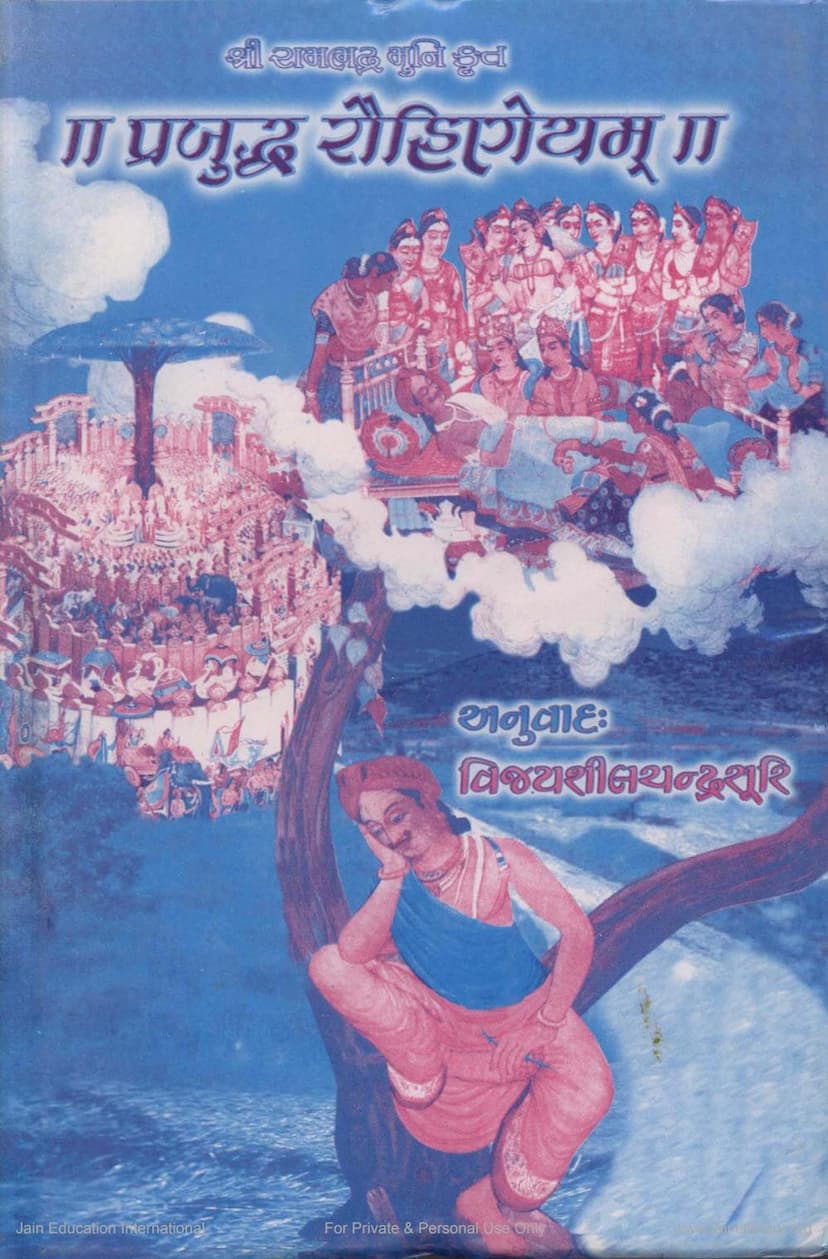Prabuddha Rauhineyam
Added to library: September 2, 2025

Summary
"Prabuddha Rauhineyam" (The Awakened Rouhineya) is an ancient Sanskrit play attributed to the Jain Muni Rambhadramuni. This book provides a Gujarati translation of the play by Acharya Shri Vijay Shilchandra Suri, published by Jain Sahitya Academy in 2003. The translation is dedicated to Dr. Harivallabh Bhayani.
The play is a "Prakaran" (a type of Sanskrit drama) that narrates the story of Rouhineya, a notorious thief. The central theme revolves around Rouhineya's eventual spiritual awakening and transformation through the teachings of Lord Mahavir Swami.
Synopsis of the Play:
The play unfolds over six acts, detailing Rouhineya's criminal career, his eventual encounter with Lord Mahavir's teachings, and his subsequent renunciation of his wicked ways.
-
Act 1: The play begins with the Sutradhar (narrator) setting the stage for the performance, which is being staged during the anniversary festival of the newly built Jain temple by Yashovir and Ajaypal of the Chahamana dynasty. Rouhineya, a cunning and fearless thief, along with his accomplice Shabar, is introduced. Rouhineya's father, Lohkhur, on his deathbed, instructs Rouhineya to never listen to Lord Mahavir's sermons, as they would lead him away from his traditional thieving profession. Rouhineya abducts Madanvati, the daughter of Dhan Sarthavah, during a spring festival. Meanwhile, Rouhineya's father's last words of caution are revealed.
-
Act 2: Rouhineya, disguised as a woman, infiltrates a wedding celebration of Manorath, the son of Seth Subhadra, and kidnaps him. The wedding guests, including the bride Vasanika and her lover Shabar, are thrown into chaos. The Seth and his wife Manorma are distraught by their son's disappearance. The act highlights Rouhineya's audacious nature and the chaos he creates.
-
Act 3: The merchant community complains to King Shrenik about Rouhineya's misdeeds. The King orders his minister, Abhaykumar, to apprehend the thief. Abhaykumar devises a plan to capture Rouhineya. Meanwhile, Lord Mahavir Swami arrives in the city for a discourse. The act sets up the conflict between the king's pursuit of the thief and the spiritual presence of Lord Mahavir.
-
Act 4: Abhaykumar's search for Rouhineya proves fruitless. He implements a city-wide lockdown, hoping to trap the thief. Rouhineya, attempting to steal from the royal palace, is inadvertently drawn towards Lord Mahavir's sermon. While trying to avoid hearing the discourse as per his father's dying wish, he steps on a thorn and, in his pain, removes his fingers from his ears. He overhears the description of celestial beings from Lord Mahavir's sermon. Rouhineya is eventually caught in Abhaykumar's trap.
-
Act 5: Rouhineya is brought before King Shrenik, who is enraged and orders his execution. Minister Abhaykumar intervenes, explaining that according to justice, a thief can only be punished if caught with stolen goods or if they confess. Since Rouhineya has not been caught with stolen items, Abhaykumar plans a ruse to make him confess. Rouhineya, believing he has attained divine status through the minister's illusion of heaven, is presented with celestial maidens. However, he recalls Lord Mahavir's description of true celestial beings and realizes the deception. When confronted, he initially maintains his fabricated story. Abhaykumar, unable to extract a confession through the illusion, eventually uses his wit and the true teachings of Lord Mahavir, which Rouhineya had inadvertently heard, to lead him towards repentance.
-
Act 6: Rouhineya, now enlightened by the true teachings of Lord Mahavir, confesses his past deeds. He expresses remorse for going against his father's wish by listening to Lord Mahavir's teachings, which ultimately led him to salvation. He surrenders all his stolen wealth and decides to dedicate his life to the service of Lord Mahavir. The king, impressed by Rouhineya's transformation and the minister's intelligence, pardons him and blesses his new path. The play concludes with Rouhineya's successful spiritual transformation, highlighting the power of true spiritual guidance.
Key Features and Themes:
- Spiritual Transformation: The core of the play is Rouhineya's journey from a hardened criminal to a spiritually awakened soul, emphasizing the transformative power of the Jain philosophy and Lord Mahavir's teachings.
- The Power of Words: The play underscores how even inadvertently heard spiritual words can sow the seeds of change and lead to enlightenment.
- Parental Influence vs. Spiritual Guidance: It explores the conflict between a father's misguided instructions and the profound impact of spiritual wisdom.
- Dexterity of Jain Acharyas: The play is presented as a "Prakaran," a genre of Sanskrit drama known for its structure and artistic merit, showcasing the literary prowess of Jain Acharyas.
- Historical Context: The play is rooted in historical context, mentioning the construction of a temple and the involvement of prominent figures from Jain history.
- Gujarati Translation: The Gujarati translation by Vijay Shilchandra Suri is praised for its lucidity, creativity, and ability to convey the essence of the original Sanskrit play. The translator's notes highlight the challenges and creative liberties taken to make the play accessible and performable.
"Prabuddha Rauhineyam" is a significant work that blends drama, philosophy, and historical context, illustrating the profound impact of spiritual teachings on human life.